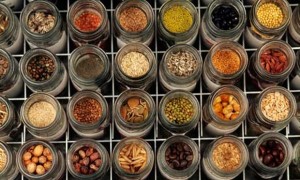In 2008, a four-hundred foot vault was built inside the mountain of a remote Norwegian island to hold backup samples of almost every known crop seed in the world. Holding over 860,000 seed samples from 5,100 different species of crops from almost every nation, the Svalbard Global Seed Vault is considered the Noah’s Ark of food crops. Dubbed the “Doomsday Vault”, it is designed to safeguard Earth’s biodiversity and food supply if there were to ever be worldwide disaster that eliminated plant variety, such as nuclear war, crippling disease, or extreme global warming. Just 800 miles from the North Pole, the seeds are protected and preserved by their remote location and permafrost.
“The purpose of the Vault is to store duplicates (backups) of seed samples from the world’s crop collections. It will secure, for centuries, millions of seeds representing every important crop variety available in the world today. It is the final back up,” said the Global Crop Diversity Trust, the company that runs the seed vault.
But now, less than a decade after opening, seeds have been removed for the very first time. What catastrophic natural disaster could have possibly caused this to happen? Unfortunately, the most manmade of problems- war. Syria’s civil war has caused immense damage not only to its people, but also the environment and infrastructure.
Headquartered in Aleppo, Syria, the International Center for Agricultural Research in Dry Areas (ICARDA) housed a large seed bank in order to do research and develop seeds genetically suitable for dry areas of developing countries. However, in 2012, the last of Aleppo’s seed storage was sent to Svalbard to preserve their collections (including drought resistant seeds) in the midst of the country’s destruction. Damage from the war, a rebel siege of the area, and daily threats proved too dangerous, forcing them to shut down. It was also unable to maintain its role as a hub to grow seeds and safely distribute them to other nations, mainly throughout the Middle East. The headquarters were moved to Beirut, Lebanon to escape conflict.
In September of 2015, ICARDA requested to withdraw 130 out of the 325 boxes it deposited to Svalbard (containing 116,000 samples) to replace seeds that were damaged by the war, continue research at ICARDA’s new location, and restore some of the genetic diversity lost in Syria during the fighting.
“It is wonderful to see the Vault is already proving its worth, and that we have been able to help our friends in the Middle East to continue their vital work,” said Arni Bragason, director of NordGen, which co-manages the Svalbard vault.
Last month, researchers took 38,000 seeds back out of the vault and delivered them from the Svalbard Global Seed Vault to Lebanon and Morocco, where they will continue the research they started in Syria. The shipment contained varieties of cereals, wheat, barley, faba beans, lentils, and chickpeas that will be planted next year and tested in hopes of developing new strains that can better withstand disease and climate change, and eventually be used to help feed a growing global population. It was the first of several shipments to be made over the next few years.
“Protecting the world’s biodiversity in this manner is precisely the purpose of the Svalbard Global Seed Vault,” said Brian Lainoff, spokesperson from the Global Crop Diversity Trust.


